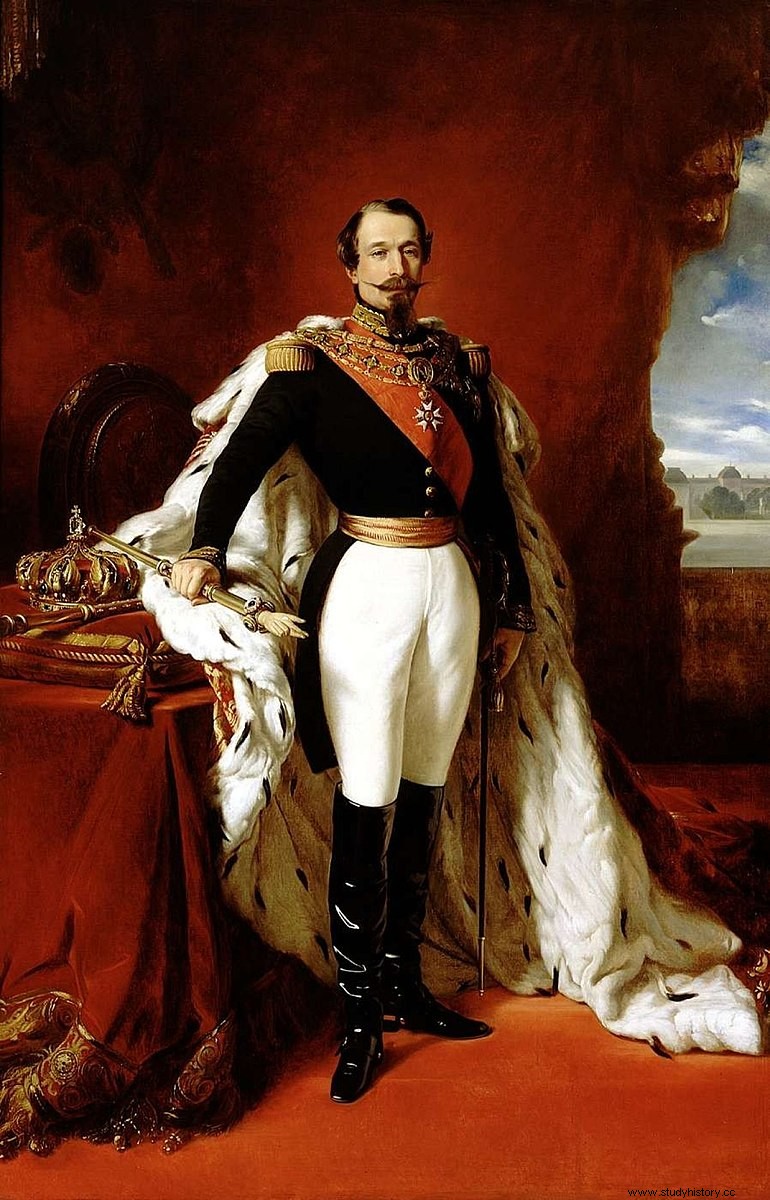The February 1848 revolution overthrew the July Monarchy to establish the Second Republic. After very progressive beginnings and the introduction of universal suffrage, the climate became more explosive in France, as the conservatives took over the reins of power.
Louis Napoleon Bonaparte was elected president in December 1848, but the Conservatives blocked his way to the Assembly. On December 2, 1851, Louis Napoleon, supported by the military, staged a coup and rid the Assembly of its enemies. He centralizes the regime around his person and writes a Constitution (1852) which makes him an absolute sovereign, before having the people accept the beginning of the Empire.
Since the crisis of 1847, the unstable political regime has not been able to solve the major problems of agriculture and industry:in 1852, everything has to be rebuilt.
December 2, 1851 - September 4, 1870

Characters
Louis Napoleon Bonaparte known as Napoleon III
George Haussmann
Adolphe Thiers
Emile Ollivier
Procedure
The Constitution, apparently democratic, enshrines a Council of State responsible for drafting laws and a Senate responsible for ensuring compliance with the Constitution; but all these institutions are under the close control of the emperor, on whom justice depends.
Until the 1860s, Napoleon III established a very personal authoritarian regime centralized around his person. The maintenance of universal suffrage is cleverly contained by a division into constituencies which is favorable to it and the restriction of all freedom of expression allowing it to imprison any opponent.
Indeed, the regime is not unanimous, it encounters the opposition of Legitimists, Orleanists and Liberals. In 1858, the Law of Suspects reinforced the powers of the political police.
Napoleon III relied on economic development and surrounded himself with financiers and Saint-Simonians; the banking system was modernized (creation of the Crédit foncier de France), the rail network developed, the first large transatlantic company was created and, in general, industry took off again at the same time as a bourgeoisie made up of notables appeared. /P>
This economic success made it possible to launch major urban modernization works from the start of the Empire, embodied by the figure of Baron Haussmann.
Like Napoleon I st , Napoleon III supports the internal development by foreign wars, trying in particular to negotiate another European order than that of the congress of Vienna. In 1854, France, with an army of 200,000 men, engaged against the Tsar alongside England in the Crimean War (between Russia and the Turks). After his victory, the Empire has new alliances and gains influence.
In 1860, the Italian campaign created a large kingdom in northern Italy which pushed back the Austro-Hungarian Empire and returned some territories to France.
Finally, the Empire follows a policy of global expansion, strengthening its presence in Algeria, the Middle East, Senegal and more generally in Africa but also in the Far East (Cochinchina, Cambodia) and in America (Mexico).
From 1860, the Empire, well established, liberalized. Economically first, thanks to a trade agreement with England, but also politically.
The Emperor gradually gave back their role to the institutions, and, in the elections of 1863, the opposition was timidly present in the Senate.
In the 1860s, the workers' movement also became more assertive (the first Workers' International took place in London in 1864), as did the opposition which finally united behind Thiers' "five freedoms" program:freedoms individuals and the press, free elections, the right to question the emperor and the responsibility of ministers.
Around 1868, Napoleon III indeed liberalized the regime by restricting its political police actions:the press slowly became more critical.
From 1869, the elections are freer and the opposition, which has won votes, is even competitive. The third party of Émile Ollivier (republican party) is in the majority in the chamber, and Napoleon III is forced to make him his minister.
He continued the work of liberalization but severely repressed the labor movements, whose leaders were hunted down. On May 8, 1870, a new Constitution was validated:it made ministers responsible to the chamber (a liberal claim), but the Senate lost its constituent power.
The authoritarian power of the Emperor thus gradually weakened with the gradual liberalization of the regime, but it was external events that caused his downfall:the diplomatic situation between France and Prussia being in perpetual escalation since 1860 about of the unification of Germany, war was declared in July 1870.
Lost in advance, the defeat did not surprise Napoleon III who capitulated on September 2, 1870, captured by Prussia. Two days later, in Paris, the Republicans proclaim the Republic.
Consequences
Napoleon III will have considerably modernized France and laid the foundations of the infrastructures necessary for its economic development.
Very authoritarian, his regime nevertheless allowed the deep rooting of the democratic values that seemed evident in 1870. The progressive liberalization of the last decade made it possible to establish a thoughtful regime, the III th Republic, of exceptional longevity.
